Video
Three Generations of Answers to a Grandmother’s Prayers
Carol Nordman prayed for decades for her father — who had rejected Christianity — to trust Jesus. The outcome changed her perspective on prayer.
July 2019
The 95-foot-tall Carrie Tower welcomes visitors to Brown University in Providence, RI.
Sam Lam expected the American Northeast to be cold, and not just in temperature. “It’s probably one of the toughest situations in the United States, or even around the world, in terms of the penetration of faith,” he says.
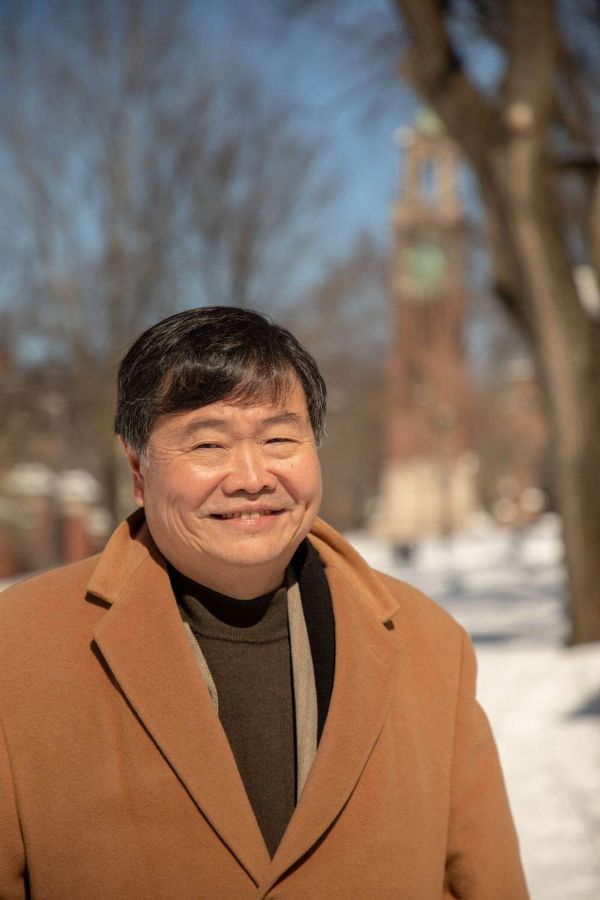
Sam Lam on the campus of Brown University, where he traveled to participate in the Executive and Entrepreneurial Leadership Forum, a Cru®-sponsored event.
Sam resides in Singapore, where he serves as president and managing partner of Linkage Asia, a global leadership development firm. His work with executives in some of the world’s largest and most recognizable companies offers him opportunities to engage with many different cultures.
“It’s a very strange phenomenon, looking from the outside,” Sam says. “The [human] need for a God-solution is quite obvious. But [that solution] has been portrayed as old, parochial, narrow-minded, exclusive — when actually Jesus and the Christian faith are the most inclusive of all. No high or low, no male or female, no slave or master. Christ is all — and in all. But we are accused of being the most bigoted if we fully believe in the Scriptures.”
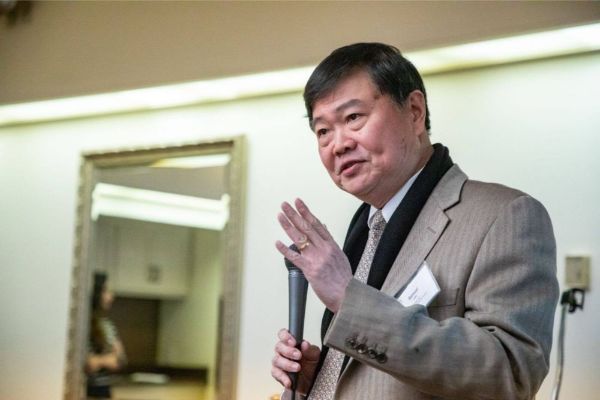
Sam addresses a group of Brown University student leaders at the Executive and Entrepreneurial Leadership Forum.
Sam isn’t alone in his sentiments. On the podcast This Cultural Moment, Australian pastor and author Mark Sayers, who is highly regarded for his insights into faith and contemporary culture, describes the current “post-Christian” age of the West as “the kingdom without the king.” In other words, the values that Jesus proclaimed as part of the kingdom of God — peace, justice, equality, truth, etc. — are championed, while God and His authority are discarded. These values have become distorted versions of themselves, and their biblical forms are viewed as obsolete or even antithetical to a progressively humanistic world.
As a result, there is a crucial question facing Christians in the Western world today: How can Christians effectively engage a post-Christian culture with the gospel?
Sam traveled to the Northeast U.S. to serve as one of three featured presenters at Brown University’s third annual Executive and Entrepreneurial Forum, or EII Forum for short. Athletes in Action® — Cru®’s sports ministry, which is active at Brown — hosted the event. Held on campuses nationwide, the EII Forum is designed to introduce top student leaders to Jesus while offering them a valuable service: leadership and life expertise from highly successful businesspeople.
“The Executive Forum allows us to get to students that wouldn’t darken the door of a Cru meeting. But they will come to an event that’s about bettering their resume and talking about leadership and mentoring.”
Pete Henschel, national field director of development, Cru's Campus Ministry

The members of Brown’s women’s soccer team, many of whom are involved with Athletes in Action®, brave the unseasonably cold March weather during a scrimmage with a Japanese traveling team.
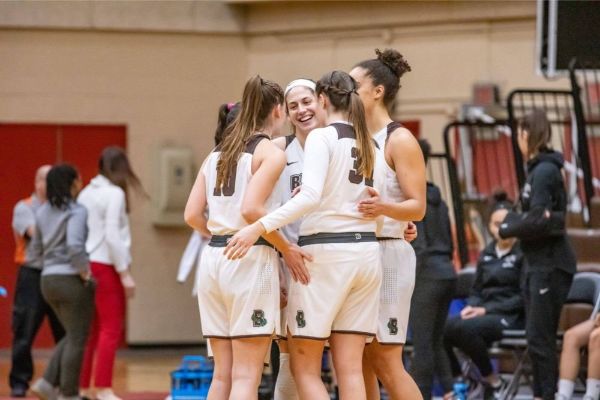
Student Justine Gaziano (center, smiling), shares a light moment with her teammates during a break in Brown’s women’s basketball game against Princeton. Justine credits AIA with broadening her view of God and providing vital Christian community.
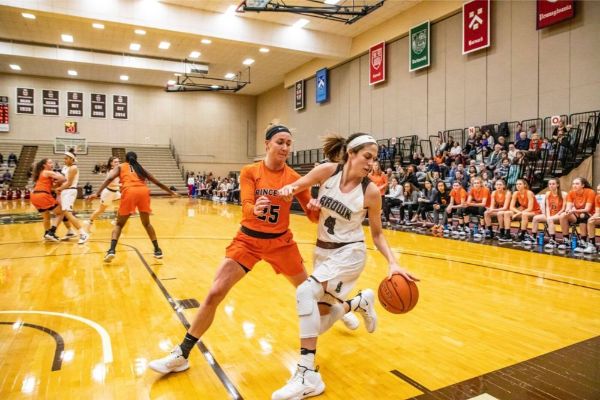
Justine attempts a baseline drive on a Princeton defender. The junior captain has been involved with AIA since her freshman year.
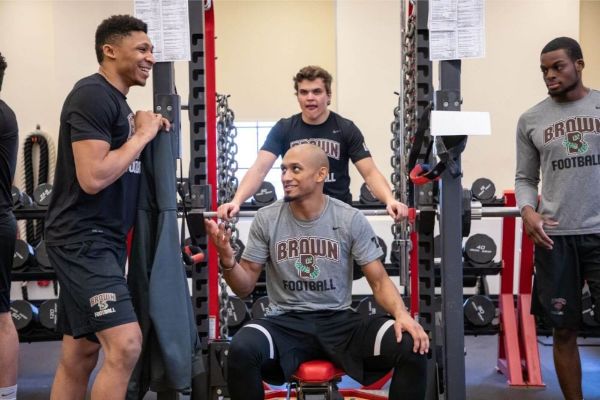
Demitri Jackson (seated), a student leader in Brown’s AIA chapter, laughs with fellow wide receivers during a football team lift. Lifts, practices, meals and meetings give teams significant time together, allowing students like Demitri to show their faith in Christ through both action and conversation.
The EII Forum follows a template that allows presenters to address several audiences over a 24-hour period, intentionally highlighting how the presenters’ faith in Christ has affected their leadership and work. The EII Forum at Brown also offered valuable insights on engaging our post-Christian culture.
Located in Providence, Rhode Island, Brown University had a religious beginning, just like its seven Ivy League brethren. Princeton was affiliated with Presbyterianism; Harvard with the Congregational Church; and Columbia with the Church of England. Brown, founded in 1764, became the Colonies’ Baptist institution.

Brown is located in the picturesque College Hill neighborhood of Rhode Island’s capital, across the Providence River from downtown. College Hill showcases a large collection of carefully preserved 18th- and 19th-century architectural styles.

The Providence skyline provides the backdrop for a student studying on an upper floor of Brown’s library.
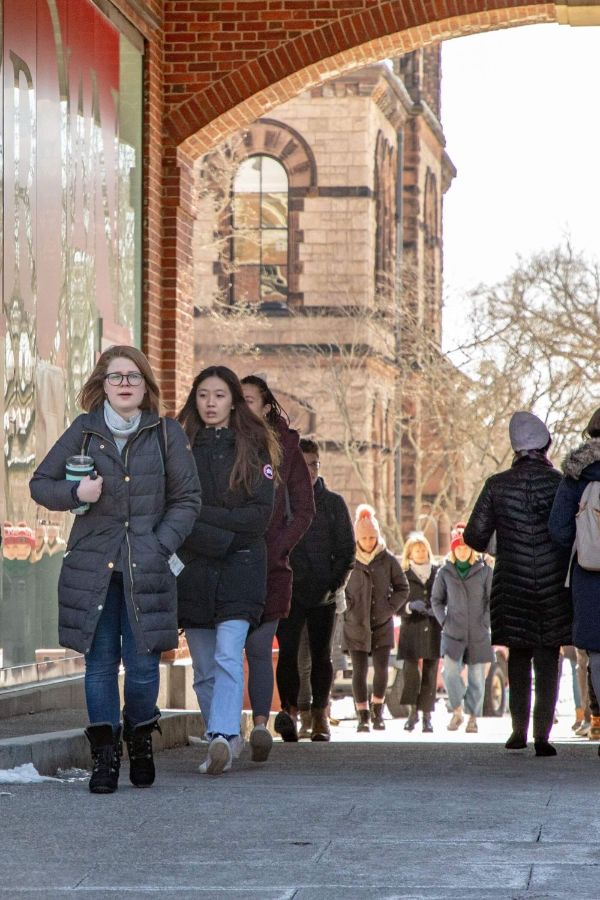
Brown students stroll through one of several archways that dot the campus. Only 9% of all applicants are accepted, making the university an epicenter of gifted young people.
Over time, Brown followed the course of the other Ivies, distancing itself from its denominational roots and becoming an incubator of post-Enlightenment philosophies, such as postmodernism and existentialism, that filtered out into the wider world. The predominant philosophy in the West today is humanism, which Merriam-Webster defines as “a philosophy that usually rejects supernaturalism and stresses an individual’s dignity and worth and capacity for self-realization through reason.”

Catherine “Cat” Seitz, a senior third baseman for Brown’s softball team, practices inside the Olney-Margolies Athletic Center, a hub of activity for Brown’s 36 varsity teams. “I feel very lucky to have become a Christian while being here,” Cat says, “because I don’t know how often that happens at a place like this.”
Brown prides itself on a diverse student body; an “open curriculum” (a student-centered system with no general course requirements); a transcript that doesn’t list GPA; and opportunities for students to design their own major or even pioneer a new course. Students commonly say, You can do whatever you want at Brown. As a result, a freethinking, inclusive energy permeates the campus, which is comprised of a series of dignified old buildings bordered by neighborhood streets.

Barrett Hazeltine relishes the creative freedom Brown offers. The beloved professor has been a member of the faculty since 1959 and has served as a discussion leader at each of the last three EII Forums on campus.
Why Ivy League schools like Brown are such advantageous places for Christian outreach.
In addition to shaping cultural philosophies, the eight Ivy League institutions have an outsized influence on world leadership. Sixteen of the 45 U.S. presidents have been Ivy League alums, and the CEOs of 14 of the top 100 companies on the Fortune 500 did their undergraduate studies at an Ivy.
The potential influence of just the five dozen students at Brown’s EII Forum is immense. The following short list of Brown alumni offers a visionary look at what role the students of today may play in the world of tomorrow and illustrates how reaching even one with the gospel has the potential to transform nations.
“The challenge at Brown is this: God is a lot like Santa Claus,” says Jarrod Lynn, leader of the Cru staff team in Rhode Island. “You don’t see a class on Santa Claus. Is he real or is he not? He’s not even considered. It’s the same thing with God. He’s not even considered on the campus.”
The belief that God is a childish idea intelligent people should move beyond is one Jarrod uses the EII Forum to combat. He joined the staff of Cru in 2007 and enjoys the challenge of ministry in a secular, intellectual environment.
“I just want to put the Christian worldview on the table. If I have to clear out some of the baggage — [the belief that] Christians are stupid or anti-intellectual, anti-science — I want to help do that, so [people] can see Jesus for who He is.”
Jarrod Lynn

Jarrod Lynn (right), who leads the AIA ministry at Brown, meets with Demitri Jackson in the Athletic Center. Jarrod, like Demitri, played football at Brown and served as a ministry leader.
On the first evening of the EII forum, bundled in a long overcoat and scarf over his jacket and tie, Sam hurried past high mounds of plowed snow to enter the Brown University Faculty Club, site of the forum’s centerpiece event — an invitation-only banquet for the campus’s top student leaders. Sixty-five others braved the frigid late winter air: a mix of student-athletes, leaders of a dozen and a half campus organizations, and adult volunteers helping with the event.
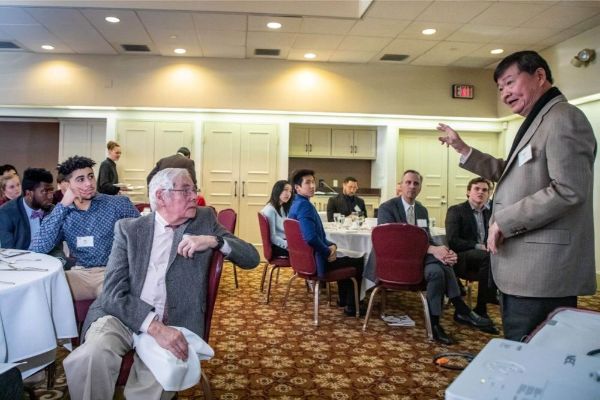
Students, professors and other EII Forum attendees listen as Sam highlights traits of successful leadership. He offered the audience a gentle warning: “Leadership is demand-driven and requires continued learning. It is hard to teach smart people how to learn.”
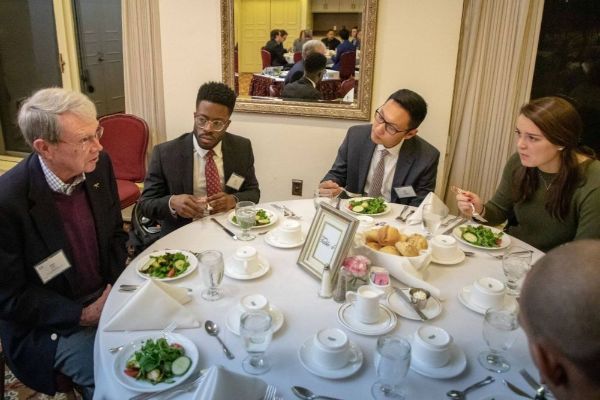
John South (left), a 1962 Brown graduate, converses with students at the EII Forum banquet. John and other table hosts guided students in table discussion after each speaker’s presentation.
Sam spoke second in the banquet’s program, as students began to delight in a meal of chicken, rice and asparagus in a rich cream sauce — unusual for college fare. In his talk, he discussed how successful leadership requires focus and humility. When he finished and returned to his seat, he joined the student leaders both in eating and in receiving an affecting message.
The deliverer of that message was the third speaker, Dan Berglund, managing director of equity derivatives for Goldman Sachs. Dan described how the pursuit of career-related achievements, especially in his first year after college, led him to frustration and dissatisfaction. He learned that he couldn’t live for what could be shown on a resume. Instead he found that true satisfaction, and the development of the character and virtues that determine a person’s lasting impact in life, is found in a relationship with Jesus.
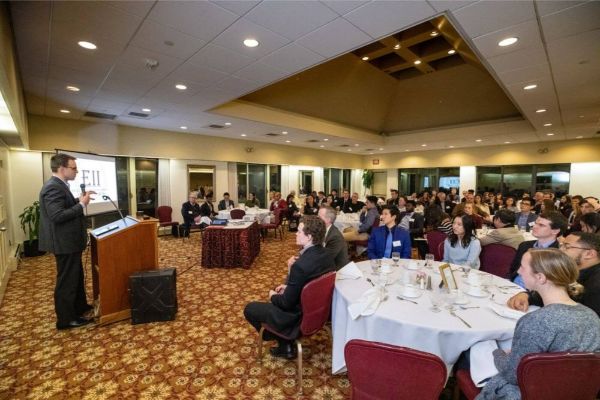
Dan Berglund speaks to the gathered students inside the Brown University Faculty Club. He has a busy job and young children, so offering his time to share his faith with students at Brown was a sacrifice, but “the opportunity to share the gospel is something to jump at,” Dan says.
The way Dan talked about his faith in Christ challenged Sam. “Myself included, and a number of people I know — in positions that are reasonably influential — for years have talked about building bridges to lead to the gospel,” Sam says. “The biggest problem is, we’ve got all these bridges built, but there ain’t enough people crossing them! That is an extremely troubling thing to me.”
Sam touches on a concept Mark Sayers describes in his book Disappearing Church: the search for relevance. The theory is that, by imitating contemporary cultural norms, a Christian can make faith more attractive to those who don’t know Christ. Some bridge-building efforts stem from this motivation. However, while relevance has a role to play in sharing Christ, in order to truly be “relevant” or accepted in today’s cultural climate, we’d have to sacrifice certain biblical positions. As a result, by pursuing relevance, some lose their faith altogether.
After the banquet, the three speakers rushed through the cold to another event, Brown’s Athletes in Action weekly meeting. In a rustic loft above a snow-covered lawn, student-athletes settled into mismatched chairs for a 45-minute panel discussion about faithfully following Christ and influencing people toward Him in the workplace.
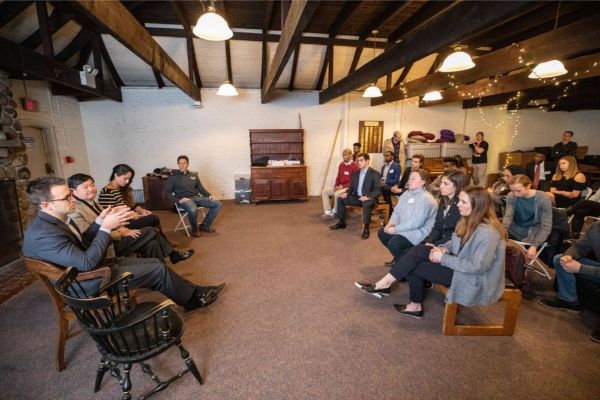
Dan, Sam, and Cru® staff member Lorenna Ellis (striped shirt) answer students’ questions at Brown’s AIA weekly meeting. Lorenna, also a Brown alum, emceed the banquet and offered insights on leading within the nonprofit world.
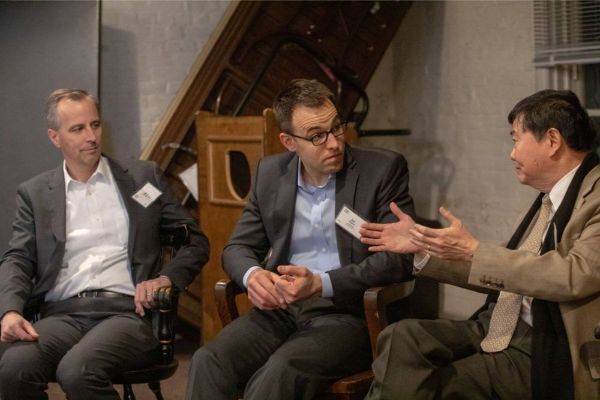
Sam, Dan, and Todd Blount (left) collaborate on the AIA weekly meeting panel. Todd, president of Blount Fine Foods, told students that creating a great work environment is one of the significant ways he lives out his faith in his work.

AIA student leader Cat Seitz soaks up the wisdom offered by the panelists.
Rather than encouraging assimilation into the culture around us, Dan pointed out that the most influential way to represent Christ in the workplace is to do what is markedly countercultural: apologize when wrong, ask for forgiveness, show forgiveness to others and resolve conflict instead of ignoring it. This vulnerability flavors relationships like spices do food; an entirely new and more inviting meal, one which becomes rich with gospel opportunity, results.
Dan also said that the courage to live in countercultural ways must be paired with a watchful, prayerful readiness. As society moves further into post-Christianity, more people will find our faith to be foreign, problematic or worse. Beseeching God to transform co-workers’ hearts — and being prepared to offer a reasonable, compassionate explanation of our beliefs — becomes vital.
Sam Lam offers guidance on bringing your faith into the office.
Sam Lam finds that his faith and work come together easily. “God gives us everything to enjoy,” he says, “so I don’t think we need to try so hard to live out our faith in work, just to be able to find that ‘divine connector’ between what God has created for us and how we live it out.” He offers three tips to integrate faith and work, which can naturally lead to opportunities to influence co-workers toward Christ:
“First, at a cognitive level, have a good theology of work: that work is good, that it is God-made. Bringing order to life is one of the biggest things that human beings do. Also, at [an emotional] level, find the joy in work.
“Second, excel in all that you do. Think about the old Puritan ethic. Whether [you are] a carpenter or a web designer or a writer, [you can cultivate] the ability to polish [your work] to the finest angle. In Proverbs it says, ‘If a man excels in his work, he shall stand before kings and not before mere men’ [Proverbs 22:29; Sam’s paraphrase]. The ability to integrate faith and work rests in excellence.”
“The third part is testimony. That’s where some of the Cru® training is useful: [in helping you develop] the ability to give a reason for your hope and the ability to respond in the midst of a crisis or the middle of a good thing, to explain your faith in a non-threatening, meaningful, unapologetically rigorous, sound way.”
Pete Henschel, national field director for development in Cru’s campus ministry, has organized EII Forums at universities across the country since 2008. He’s quick to point out the “wins” the event can bring to a campus movement. First, future leaders hear the gospel; on average, 15% of banquet attendees indicate a decision to receive Christ. Second, the gospel footprint of the Cru ministry increases; although they aren’t employed at Brown, about 40% of EII Forum presenters are invited to address classes related to their field. And finally, students involved with Cru are inspired by leaders boldly sharing the gospel on their campuses.
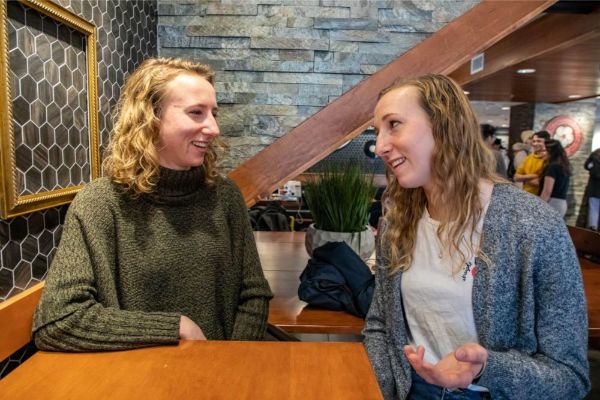
Jessica (left) and Allison Bellows (right), twins who run cross country and share the same major, chat at an off-campus coffee shop. About the EII Forum, Allison says, “It’s a different type of encouragement to see Christians who are older and living their faith journeys 10 or 20 years down the road from where you are.”
Pete is just as quick to highlight how the forums affect the lives of presenters. A few years ago he received a voicemail from a speaker at an EII Forum in Duluth, Minnesota. He marveled to hear the speaker enthusiastically say, “Pete, I think this was the most important thing I’ve ever done in my whole life.”
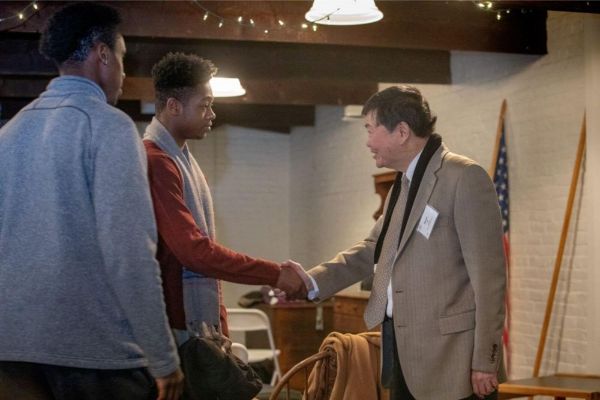
Sam greets two student-athletes after the AIA weekly meeting. The EII Forum had a sharpening effect on Sam. He says the event encouraged him “to see how we can be discipled afresh.”
Sam left Providence motivated to share Christ more intentionally back in Singapore and wherever his work may take him. “The opportunity is there [to lead others to Christ],” he says. “I’ve not leveraged the social, reputational, emotional capital I’ve built over the years. I need to take that one step further.”
For centuries the now-archaic word “Christendom” was somewhat synonymous with the Western world. Societal values were largely shaped by Christianity, which became the dominant faith, even if many within society were only nominally Christian.

Brown’s campus in winter provides an apt metaphor: the institution’s grand old structures, which recall a past profoundly shaped by Christianity, are now a bastion of humanism draped in spiritual iciness.

The Brown University crest hints at its Christian roots. The school’s Latin motto, "In Deo Speramus," means “In God We Hope.”
Now, as humanism increasingly becomes the predominant civic worldview, Christians in the West are finding themselves in a situation that resembles that of the New Testament era: living as a minority group with a radically different set of beliefs than the mainstream. Instead of lamenting this, we can embrace it and find opportunity.
In Disappearing Church, Mark Sayers calls Christians to be a “creative minority,” much like Jews in the Babylonian Exile. In Jeremiah 29, God called these exiles to take root in Babylon and seek its peace and prosperity, while remaining set apart for Him. Sayers writes, “This dependency on a source of power and truth outside of the dominant culture leads creative minorities to refresh and reinvigorate ailing cultures.” It takes courage and willingness to be viewed as outside the “norm,” but it may allow us to regain some of the influence we’ve lost through pursuing relevance.
Here are a few resources and ideas to help:
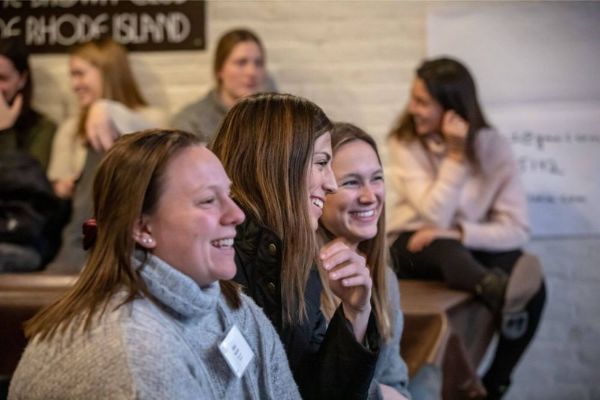
Students laugh together at AIA’s weekly meeting. Many of the students point to the community as an anchor for their faith in Christ.
How have you been able to share your faith in Christ with those around you?
Share your story
Jason writes for The Communications Group of Cru®. He served as a team leader for Cru’s campus ministry in Pittsburgh for seven years. He has one wife, three kids, and an embarrassing number of brain cells reserved for the Pittsburgh Pirates.
Contact Me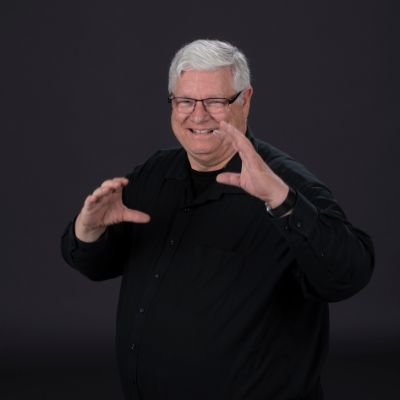
Tom is a photographer with Cru®. He loves seeing beautiful sights out of airplane windows and enjoys meeting new friends all over the world. His wife, Karen, travels with him whenever possible, which makes every trip even better. Tom has been photographing for more than 40 years.
Contact Me